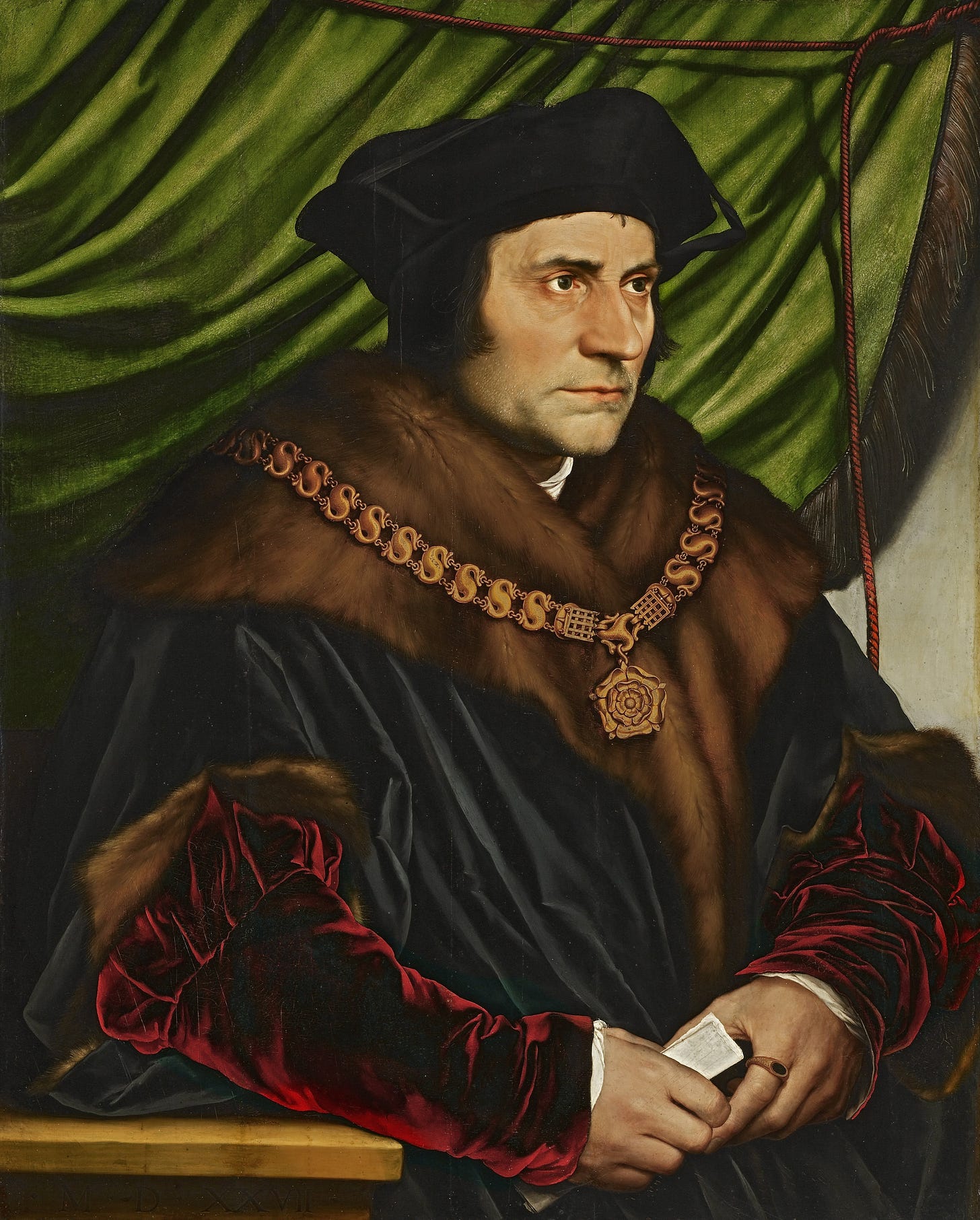“Behold, I am sending you out as sheep in the midst of wolves, so be wise as serpents and innocent as doves.”
~Matthew 10:16
Sir Thomas More, 16th-century polymath, theologian, and statesman, was renowned across Renaissance Europe for his learning. Works of his like Utopia persist, shaping our minds and imaginations to this day.
But in his day, More was equally renowned for his incredible kindness. Erasmus of Rotterdam, another Renaissance polymathic theologian, described More this way:
Such is the kindliness of his disposition, or rather, to say it better, such is his piety and wisdom, that whatever comes his way that cannot be corrected, he comes to love just as wholeheartedly as if nothing better could have happened to him.
In her delightful book Super-Infinite, a biography of poet John Donne, Katherine Rundell recounts how More’s kindness stayed with him until his death.
A remarkable fact, considering that he was beheaded.
The story goes that he joked with his executioner as he walked up the scaffold, urging the man not to miss his mark on account of More’s short neck.
After his death, the Undersheriff of London was unsure what to think about More:
I cannot tell whether I should call him a foolish wiseman, or a wise foolishman.
In this verse from Matthew, Jesus exerts us to be “wise as serpents and innocent as doves.”
I’ve typically heard it explained that you should seek God’s wisdom, which simply looks like a foolish innocence to our sinful, wicked world.
Other times, it’s explained by saying that some times require wisdom; others require innocence. (This explanation seems to beg the question. Are you to use your wisdom or your innocence in deciding which one the current moment demands?)
The description of Thomas More given by the Sheriff, though, seems like the right explanation. We must pursue an indivisible integration of wisdom and innocence, a wise-foolishness, or a foolish wisdom.
After all, Jesus didn’t say “Sometimes, be as wise as serpents; other times, be as innocent as doves.”
The truth is, we’re called to be both, all the time; both at the same time.

True Paradox
It is the hallmark of any deep truth that its negation is also a deep truth.
~Niels Bohr
Nobody embodies truth more than Jesus—after all, in his very nature, he’s both fully God and fully man. So we shouldn’t be surprised that his teachings give us truths that are often paradoxical.
The paradoxes at the heart of our faith shouldn’t just be explained away, or written off as mysteries. They’re essential, and everywhere.
To really understand a paradox, you have to try to live it, to walk into to.
In fact, living into it is the only way to resolve a paradox. Consider the paradox of Achilles & the tortoise:
In a race, the quickest runner can never overtake the slowest, since the pursuer must first reach the point whence the pursued started, so that the slower must always hold a lead.
Or the dichotomy paradox:
That which is in motion must arrive at the half-way stage before it arrives at the goal. Since each half-way stage has its own half-way stage, and there’s no end to the infinite division of halves into more halves, you can never actually get anywhere.
Or the Ship of Theseus paradox:
Theseus, King of Athens, uses a ship to rescue his people from Minos & the Minotaur. Every year, the Athenians commemorate their rescue by taking the ship on a pilgrimage. Every year, though, a few boards in the ship need to be replaced to keep it seaworthy. After a number of years, the Athenians realize that no original boards remain in the ship. So isn’t it silly to think they’re using the same ship?
As
writes in The Matter with Things, these paradoxes can really stump us only if we live with the purely logical parts of our brains.You can defeat the dichotomy paradox: just walk to the store!
Achilles defeats his paradox—and the tortoise—by simply passing the tortoise and winning the race.
Similarly, the pilgrims on Theseus’s ship know it’s the same ship because they sail in it year after year, new boards be damned.
You can protest and argue the logic all you want—after all, the logic is perfectly sound, as far as it goes.
It just doesn’t go very far. It doesn’t touch on the messy reality of life.
The existence of paradoxes points to divisions in our own minds—between the theoretical-logical-black-and-white and the practical and wise.
Paradoxes like the one Jesus gives us here in Matthew also remind us that Christianity isn’t primarily a rigid, logical set of doctrines. Doctrine is certainly important; without it faith would be void of content, a vague spirituality that is blown about by the wind. But doctrine’s the starting point, not the finish line or even the race itself. No, Christianity is given to us as a way of life.
As the living paradox Jesus reminds us:
I am the way, the truth, & the life.






I always love reading your insights…thank you for continuing to share!
Thanks for this Matt, this beautiful morning. Simple yet profoundly complex, like much of life!